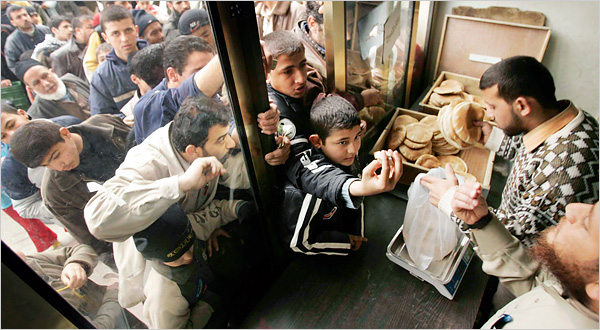Dit is geen nieuw nieuws, zei de directeur van de UNWRA, John Ging. Wie wil het nog horen?
In Gaza was de situatie al slecht, nu is die nog slechter. Een paar verhalen, van Amira Hass en links naar het onvolprezen Electronic Intifada. Voor wie het wel wil weten. De foto hierboven is van toen er nog brood was. Dat is nu op.
This is Gaza
Amira Hass
Haaretz
27.11.08
If it`s not the power getting cut, leaving entire neighborhoods in darkness, then it`s the water not reaching the top floors or the cooking gas running out. If you have an electric generator, some small part of it is bound to be broken and unfixable, because even before the hermetic three-week siege, Israel prohibited bringing in any spare parts for cars, machines and household electric appliances.
And if you somehow manage to find the money for a generator that was smuggled through the tunnels (its price has doubled or tripled since last month), it`s at the expense of buying a heater (not electric, of course), English lessons, clothes for the children and visits to the doctor.
This is Gaza in November 2008. Just as Gaza is the emptying of the United Nations Relief and Works Agency storehouses and the farmers who sowed and watered, but cannot market, their tomatoes, guavas and strawberries out of the Gaza Strip because Israel forbids it, it is also the calmness with which people receive the sudden darkness and the jokes that there is not much food in the refrigerator to spoil anyway.
Gaza is the ability to tell jokes in any situation, and the burning insult of having no running water for three or four days. And yet, the children go clean and neat to school.
Gaza is the long Nasser Street which has been blocked to traffic for over a year. Its asphalt is torn out and it is riddled with potholes and mounds of sand. When Israel forbade bringing any construction materials and raw materials into the strip, the renovation work stopped on this thoroughfare, the main access to three hospitals, which are always in danger of equipment failure if some part breaks down.
But Gaza is also parents leaving their children alone at home, without fear, or letting them go to a playground far from home, or go by themselves to their grandmother in the Jabaliya refugee camp (in the streets parallel to Nasser Street).
Gaza is reports of policemen attacking Fatah supporters at a university, or the police closing a restaurant for one night because its owners didn`t report in advance about a symposium that was held in the restaurant`s hall, in which Hamas speakers participated and was organized by a research center associated with Ramallah authorities.
Gaza is the teacher who forces school girls to cover their heads, although senior officials assert that this is not the education ministry`s policy. It is exaggerations and false rumors, and it is also the Fatah detainees` report that cameras were installed in the interrogation room to ensure that the interrogators act within the boundaries of the law. It is the surprise when `Hamas` police restore stolen property, even before it has been reported stolen.
Gaza is the feeling among Fatah supporters that the power has been stolen from them, and their fear of the security apparatus, as it is Hamas` self confidence. It is the comparisons made with the intimidation methods in Yasser Arafat`s era and exchanging information about the suppression of Hamas activity in the West Bank.
Gaza is the anger of the entire public, including Fatah members, for what appears to be Ramallah`s deliberate neglect and indifference toward the strip and its residents` fate.
Gaza is those dreaming to leave it, and those who left years ago for school and work and miss it. Gaza is the people who cannot return to their families here, because even if they could find a crack and enter through the border crossings blocked by Israel, they would remain imprisoned here, and would have to renounce their freedom of movement and choice completely.
Everything is so intense here.
`We measure our lives in minutes, not in days or weeks,` a Fatah man said. His life has been turned upside down since June 2007, and is turned upside down every day due to the political rupture. He was referring to Fatah men like himself, convinced that Hamas people in the West Bank also `measure their lives in minutes.`
But his description suits everyone. The changes are so sudden, violent, swift and frequent that the individual has no control over them – whether it is high politics or laundry times.
Gaza is people`s constant attempt to cling to a normal life, although Israel foists on them abnormal terms of imprisonment, isolation from the rest of the world and deterioration to a state of humiliating dependence on international charity programs.

